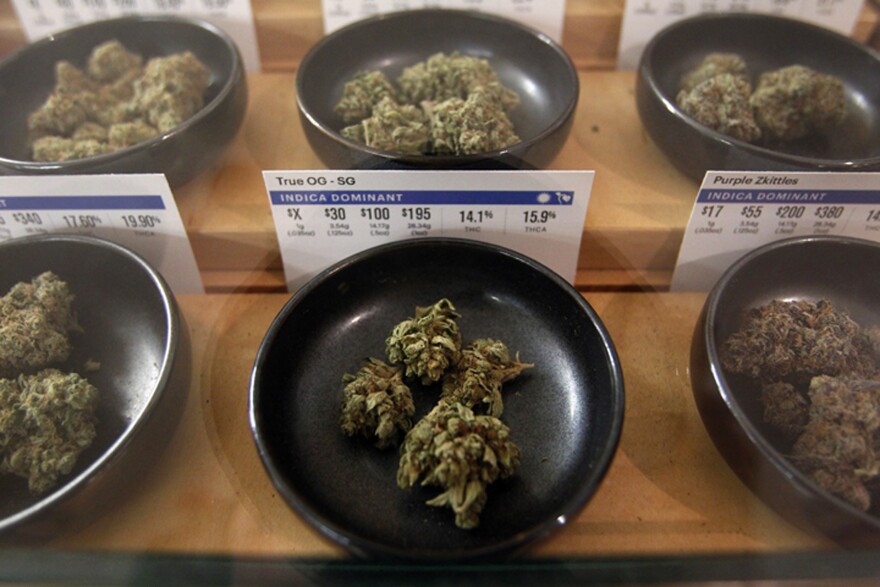Oklahoma’s medical marijuana industry will likely conduct business only in cash. That puts a wrinkle in how the state will collect taxes.
The Journal Record’s Sarah Terry-Cobo talks with Jacob McCleland about how other states tax the cash-only industry.
FULL TRANSCRIPT
Jacob McCleland: You're listening to the Business Intelligence Report, a weekly conversation about business news in Oklahoma. I'm Jacob McCleland and our guest is Journal Record senior reporter Sarah Terry-Cobo. Sarah thank you so much for talking with us today.
Sarah Terry-Cobo: Hi Jacob. Happy to be here and thanks for having me.
McCleland: Well I want to talk with you today about a recent Journal Record story about taxing Oklahoma's new medical marijuana industry. There's going to be a 7 percent tax on sales of medical marijuana, but that's going to be complicated because it'll likely be a cash-only business. First why will medical marijuana largely be cash-only?
Terry-Cobo: Well that's because the substance is still considered illegal at a federal level and all banks that are FDIC-insured are banned from conducting illegal activity. So if you can't use a bank card you have to use cash.
McCleland: So why is it more difficult to tax a cash-only industry like this?
Terry-Cobo: Well, because so many businesses have moved to electronic systems, they remit their taxes to the state electronically too. So they won't have to completely reinvent the wheel when it comes to this because for a century businesses did use cash. So Oklahoma has been looking to the Federation of Tax Administrators, and it's kind of like a trade group for state tax agencies. Veranda Smith, she's the deputy director of that organization. She says it will be a new wheel so to speak, as far as establishing the procedures to collect those cash tax remittances.
McCleland: What kinds of security measures will the tax commission have at its disposal for collecting these taxes?
Terry-Cobo: Well, the agency already has a procedure in place for large cash amounts. And for a while they will still use law enforcement agencies. They're going to beef up the number of safes and guards that they will use and they'll probably need to invest in more security services. The Tax Commission has put out a bid for armored truck services to deliver those cash payments. And in the meantime it's kind of a work in progress.
McCleland: What have other medical marijuana states done to address these issues?
Terry-Cobo: So Smith at the Federation of Tax Administrators has training sessions available for how to develop and to implement policies. In California they have secure meeting points for a business owner to remit the cash to a tax agent. But North Dakota, that state has actually exempted cannabis from taxation because they consider it a prescription, and prescriptions are not tax in that state.
McCleland: So for a really long time, I'm thinking, most tax collections were with cash, right. So we're obviously in an age now though in which digital collections are more common. How is collecting tax in cash from medical marijuana sales any different from collections back in the day before electronic transactions became became commonplace?
Terry-Cobo: Well so at this point a bit of speculation and a bit of educated guess since it hasn't gone into place just yet. But if we can learn from other states, it will simply be the volume of cash that will likely flow through those dispensaries. And how do you physically and safely get that much money to a state agency?
McCleland: So we've been talking about state taxes so far what about federal taxes. Will dispensaries have to pay those taxes in cash too?
Terry-Cobo: Well it's hard to tell really. A local tax adviser from BKD tells us that federal taxes are required to be submitted electronically. Not sure if the feds are making an exception for marijuana businesses but figuring out how to physically deliver cash to the IRS or to remit those taxes will be challenging.
McCleland: Now so far we've discussed a lot of the logistical issues for simply paying the tax -- actually getting that money to a government. What it or some other tax issues that are unique to medical marijuana here?
Terry-Cobo: Right. Well it's really interesting actually because it's still illegal federally, cannabis companies won't be able to take the same business exemptions that a normal business would. The U.S. tax code prohibits deductions and credits for businesses that are trafficking in controlled substances. And a tax attorney, who is a source of ours, he says these businesses operate basically like a 70 percent effective tax rate because of all the deductions and exemptions you won't be able to take. Now this tax law has been on the books since about 1982. It was in response to a tax court case that was addressing deductions from a trade or a business that was selling marijuana, cocaine and amphetamines. And that's the law that disallows these deductions for rent, utilities, vehicle expenses, that sort of thing that most businesses can deduct.
McCleland: Sarah Terry-Cobo is the Journal Record's senior reporter. Sarah thank you so much for your time.
Terry-Cobo: Absolutely. It's my pleasure, Jacob.
McCleland: KGOU and the Journal Record collaborate each week on The Business Intelligence Report. You can find this conversation at kgou.org. You can also follow us on social media. We're on Facebook and Twitter @journalrecord and @kgounews.
The Business Intelligence Report is a collaborative news project between KGOU and The Journal Record.
As a community-supported news organization, KGOU relies on contributions from readers and listeners to fulfill its mission of public service to Oklahoma and beyond. Donate online, or by contacting our Membership department.
The Journal Record is a multi-faceted media company specializing in business, legislative and legal news. Print and online content is available via subscription.
Music provided by Midday Static.






